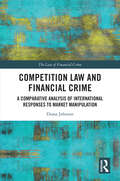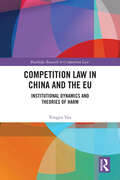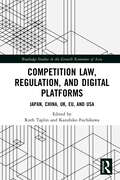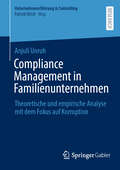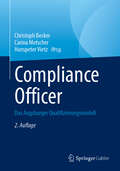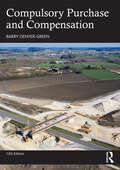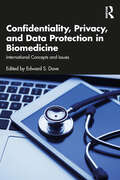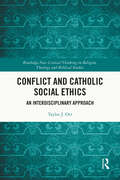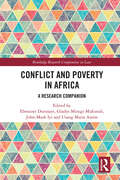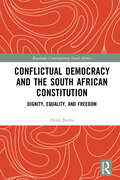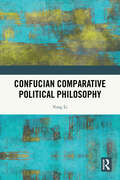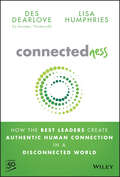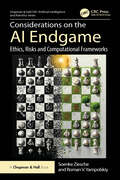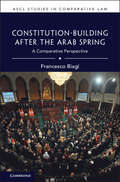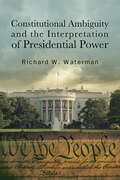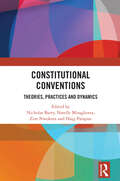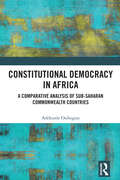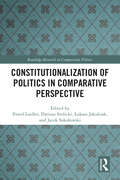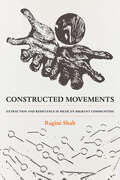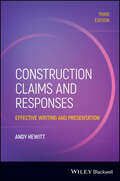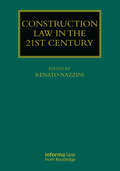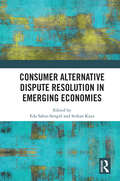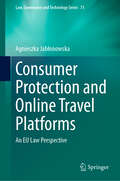- Table View
- List View
Competition Law and Financial Crime: A Comparative Analysis of International Responses to Market Manipulation (The Law of Financial Crime)
by Diana JohnsonFinancial crime is a significant drain on economies across the world. This book looks at one aspect of financial crime, that of benchmark interest rate manipulation by competing banks, with the aim of identifying the best approach for the United Kingdom to take to the enforcement of laws against future benchmark manipulation.The manipulation of any benchmark interest rate by bankers, colluding for their own gain, is likely to negatively affect a large proportion of the population, as many people have loans pegged to a benchmark interest rate. This monograph investigates the approach the UK took to enforcing action against the benchmark manipulation which took place in the London Interbank Offered Rate and the Foreign Exchange benchmark manipulation scandals. As part of this investigation, the approaches taken in the European Union and the United States of America are examined and compared to the approach taken in the UK for the same crime to draw conclusions and make recommendations to improve the UK approach for future instances of benchmark manipulation. The work fills an important gap in the literature by comparing and evaluating the laws and enforcement policies pertaining to the use of competition law in counteracting benchmark manipulation in the UK, EU and US. It argues that competition law is an effective enforcement tool when used in the financial services sector and that it provides regulators with a wide range of enforcement options when a breach of competition law is established.The book will be a valuable resource for academics, researchers and policymakers working in the areas of financial crime, competition law, comparative law and criminal justice.
Competition Law in China and the EU: Institutional Dynamics and Theories of Harm (Routledge Research in Competition Law)
by Xingyu YanThis book presents a comprehensive review of the Chinese and European responses to the abuse of market dominance, with a focus on the impact of antitrust institutional dynamics on enforcement decisions.It uses the methods of functional comparison and case analysis to investigate how theories of harm relating to specific types of abuse differ within and across competition law regimes due to institutional dynamics. The Chinese and EU competition law regimes serve as excellent examples for this investigation because they have similar substantive laws on paper but vastly different institutional settings. The book examines—first individually and then comparatively—how the distinct institutional dynamics in the Chinese and EU regimes shape the development of theories of harm.This volume will appeal to competition law scholars, students, and practitioners seeking a more nuanced understanding of how competition law works in the EU and China. It will also interest scholars trying to approach the Chinese legal system from an engaging rather than alienating standpoint.
Competition Law, Regulation and Digital Platforms: Japan, China, UK, EU and USA (Routledge Studies in the Growth Economies of Asia)
by Ruth Taplin Kazuhiko FuchikawaThis book confronts and analyses how competition law in its present form is unable to deal with the new advances in digital technology that have made tech giants not subject to national jurisdictions as they straddle the world, with a particular focus on Japan, China, UK, EU and USA.Demonstrating how the gatekeeping role of digital platforms has broken through the boundaries of national regulation, this book highlights examples where companies have broken and infringed antitrust law with impunity, pursuing self-preferencing and unfair competition practices solely for their own profitability. It also identifies how tech giants can open their digital platforms for fair use by consumers, small and medium enterprises (SMEs), and creators ,while still allowing tech giants to maintain their important role as gatekeepers of digital security that protects users from cyberattacks. This is followed by an examination of the similarities between tech giants and big pharma within the competition law and intellectual property context, revealing how tech giants are beginning to target the healthcare sector.Exploring how intellectual property rights are interwoven through new modernising regulations to curtail the dominance of Big Tech on digital platforms, this book will appeal to students, scholars and practitioners of Business Ethics, Intellectual Property, Law, and Regulation.
Compliance Management in Familienunternehmen: Theoretische und empirische Analyse mit dem Fokus auf Korruption (Unternehmensführung & Controlling)
by Anjuli UnruhAnjuli Unruh beleuchtet in diesem Buch die zunehmende Bedeutung von Compliance-Management als Bestandteil einer nachhaltigen Corporate Governance, insbesondere in mittelständischen Familienunternehmen. Sie reagiert auf die wachsende Relevanz von Wirtschaftskriminalität und die damit verbundenen Herausforderungen, die durch regulatorische Anforderungen und öffentliche Erwartungen verschärft werden. Im Mittelpunkt steht das Spannungsfeld zwischen gesetzlichen Vorgaben, individuellen Governance-Strukturen und den soziokulturellen Besonderheiten von Familienunternehmen. Ziel ist die Entwicklung eines konzeptionellen Ansatzes, der die Führungs- und Kontrollstrukturen in mittelständischen Familienunternehmen systematisch abbildet und dabei die Wechselwirkungen zwischen Compliance-Management, Wertschöpfung und Korruption berücksichtigt. Die Analyse liefert praxisnahe Erkenntnisse und evidenzbasierte Handlungsempfehlungen zur Verbesserung des Compliance- und Anti-Korruptionsmanagements. Sie trägt zur Erweiterung der Wissensbasis im Bereich der Unternehmensführung bei und zeigt auf, wie Compliance-Management als Erfolgsfaktor für eine werteorientierte und nachhaltige Unternehmensführung in mittelständischen Familienunternehmen implementiert werden kann.
Compliance Officer: Das Augsburger Qualifizierungsmodell
by Christoph Becker Carina Metscher Hanspeter VietzAufbau, Implementierung und Gelebtwerden einer Compliance-Organisation in Unternehmen erfordern eine ganzheitliche Sichtweise auf das Thema. Ausgehend von juristischen und betriebswirtschaftlichen Fragestellungen beleuchten die Beiträge dieses Bandes die wichtigsten Compliance-Risiken in Unternehmen. Die Autoren diskutieren die Implementierung im Rahmen der Unternehmensorganisation und legen besonderes Augenmerk auf die IT-Strukturen. Die persönlichen Anforderungen an den Compliance-Beauftragten sowie die ethische Verantwortung im Bereich der Compliance bilden einen weiteren Schwerpunkt. Die konsequent praxisorientierte Behandlung des Themas Compliance wird im Kapitel "Praxisfragen der Compliance" mit Themen wie Compliance und M&A, Collective Action, Compliance im Konzern explizit betont.
Compulsory Purchase and Compensation
by Barry Denyer-GreenCompulsory Purchase and Compensation remains the essential guide to this complex and increasingly relevant area of the law. Now in its 12th edition, no other book presents the same level of information on the law relating to compulsory purchase and compensation in England and Wales in such an accessible way.The book is also especially suited to those coming to this complex subject without a specific background in the law and is ideal reading for those students taking planning and built environment modules. Surveyors in particular will find this book invaluable.Whilst this new edition picks up the very many decisions of the Upper Tribunal and the higher courts since the 11th edition, the principal piece of new legislation is the Levelling-up and Regeneration Act 2023. One of the controversial provisions in the 2023 Act is the power to include in a compulsory purchase order a direction, the effect of which is that in relation to certain limited purposes, compensation shall be assessed on the basis that no planning permission would be granted for development on the relevant land; in effect, no hope value and only existing use values would be paid.
Confidentiality, Privacy, and Data Protection in Biomedicine: International Concepts and Issues
by Edward S. DoveFeaturing contributions from leading scholars of health privacy law, this important volume offers insightful reflection on issues such as confidentiality, privacy, and data protection, as well as analysis in how a range of jurisdictions—including the US, the UK, Europe, South Africa, and Australia—navigate a rapidly developing biomedical environment.While the collection of personal health information offers the potential to drive research and innovation, it also generates complex legal and ethical questions in how this information is used to ensure the rights and interests of individuals and communities are respected. But in many ways laws have struggled to keep pace with technological developments. This book therefore seeks to fill a lacuna for legal insight and reflection. Over three parts, the book first explores the conceptual landscape which law and legal institutions must contend, and then turns to examine practical issues such as the GDPR, secondary use of data for research, genomic research, and data trusts.With cutting-edge analysis drawing on domestic and international case law, legislation, and policy, this comprehensive volume will prove fascinating reading for all students and researchers interested in this evolving and contentious area of study.
Conflict and Catholic Social Ethics: An Interdisciplinary Approach (Routledge New Critical Thinking in Religion, Theology and Biblical Studies)
by Taylor J. OttThis book focuses on the question of how to understand conflict and its place in Catholic and Christian social ethics. The author examines Catholic social teaching (CST) for its explicit mentions of conflict or contention and analyzes the way that CST addresses the subjects of peace, labor, and environment. While CST offers precedent to think about conflict within the frame of Catholic ethics, its lack of explicit engagement remains a major obstacle to a full, rich, and concrete understanding of the fabric of society and the work of social justice. Any social ethic that is not informed by the presence of conflict misses a major dynamic in society, and therefore leads to ethical judgements that are at best inadequate, and at worst, actively harmful. Building upon the insight of respected thinkers within Catholic social thought, this study is based on an interdisciplinary method that engages sociology, political theory, postcolonial theory, and intersectional feminist ethics. The book will be of particular interest to theological ethicists and those who work with modern CST.
Conflict and Poverty in Africa: A Research Companion (Routledge Research Companions in Law)
by John-Mark Iyi Ebenezer Durojaye Gladys Mirugi-Mukundi Usang Maria AssimThe contributors to this book examine the conceptual issues relating to the link between conflict and poverty as well as presenting case studies of countries often regarded as ‘hot spots’ for conflict in Africa. They also explore the roles of regional and sub-regional bodies and institutions in addressing the causes of poverty and mitigating the impacts of conflict on vulnerable and marginalized groups.Africa is often regarded as the epicentre of conflicts worldwide. Virtually every part of the continent is currently engulfed in one form of conflict or another. Beyond the loss of life, conflicts have brought untold hardship to millions and have derailed social and economic development on the continent. Written by African academics, this book is divided into three sections, the first of which discusses the factors that fuel conflicts and the nature and impacts of conflicts on vulnerable groups. The second section comprises case studies of South Sudan, Central African Republic, Nigeria, Ethiopia, South Africa, Uganda, and Cameroon. These countries are representative of the sub-regional dynamics of Africa – west, east, central, and south – reflecting the diversity of the continent. The final section examines the role of key institutions and bodies in Africa in mitigating the impact of conflict on the socioeconomic lives of the people in the region. Bodies discussed include the African Union, Economic Community of West African States, Southern African Development Community, and the East African Community.The book will be an invaluable resource for researchers, academics and policymakers working in the areas of law, political science, human rights, peace studies, development studies, and African studies.
Conflictual Democracy and the South African Constitution: Dignity, Equality, and Freedom (Routledge Contemporary South Africa)
by Henk BothaHuman dignity, equality, and freedom are central to the South African Constitution. This book examines these values through a conflictual democratic lens, which views conflict, power, and disagreement as constitutive of democracy.The book explores the capacity of value-based constitutional interpretation to create openings for democratic dialogue and emancipatory social struggles. Conversely, it also assesses the ability of constitutional interpretation to normalise and depoliticise domination, inequality, and exclusion. The book uses a conflictual frame to shed light on the interplay between the universality of dignity, equality, and freedom and the particularity of the discourses and conventions that mediate their interpretation and enforcement. It argues that such a frame could enable realistic assessments of the ability of the constitutional order to safeguard spaces for emancipatory struggles and respond to radical demands for the reconstitution of society.Drawing on the text of the Constitution, case law, academic commentary, and constitutional, political, and critical legal theory, this book will be an important read for researchers of constitutional law and critical legal theory, both within South Africa and beyond.Henk Botha is a Professor in the Faculty of Law, Stellenbosch University, South Africa.
Confucian Comparative Political Philosophy
by Yong LiThis book conducts a comparative study between Confucian political philosophy and contemporary political philosophy in the analytic tradition.The author demonstrates the relevance of Confucianism to contemporary discussions on important political ideals, such as equality, democracy, human rights, perfectionism, and global justice. He also introduces individual Confucian thinkers, including both historical figures like Kongzi, Mengzi, and Xunzi, and contemporary thinkers such as Kang Youwei and Mou Zongsan. By arguing whether certain Confucian ideals can broaden current debates in political philosophy, the book moves the discussion further.The book will appeal to graduate students and scholars studying ethics, political philosophy, and Chinese philosophy.
Connectedness: How the Best Leaders Create Authentic Human Connection in a Disconnected World
by Des Dearlove Lisa HumphriesImprove talent retention and employee productivity by encouraging connectedness in your firm In Connectedness, British business journalist and management theorist Des Dearlove delivers an insightful and practical discussion of how firms can build meaningful and authentic connections with their employees, encouraging productivity, improving talent retention, and creating an enduring competitive advantage. You’ll find out why the latest peer-reviewed research lends support to the notion that it is the nature of interpersonal environments – and not compensation – that many employees consider to be the most impactful when they’re deciding whether to exit a job. In the book, you’ll: Explore the most important factors that determine the connectedness of a healthy working environment Common mistakes and myths about employee wellbeing that sidetrack managerial efforts to improve working culture at a firm Examples and case studies that demonstrate the real-world impact of the ideas discussed in the book Perfect for managers, executives, directors, and other business leaders seeking to improve employee retention, productivity, engagement, and health, Connectedness is also a must-read resource for employees, human resources professionals, consultants, and everyone else with an interest in employee wellbeing and workplace productivity and safety.
Conserving Nature in Greater Yellowstone: Controversy and Change in an Iconic Ecosystem
by Robert B. KeiterThe story of how Yellowstone, established in 1872 as the world’s first national park, has become synonymous with nature conservation—and an examination of today’s challenges to preserve the region’s wilderness heritage. For more than 150 years, the Yellowstone region—now widely known as the twenty-three million acre Greater Yellowstone Ecosystem—has played a prominent role in the United States’ nature conservation agenda. In this book, Robert B. Keiter, an award-winning public land law and policy expert, traces the evolution and application of fundamental ecological conservation concepts tied to Yellowstone. Keiter’s book highlights both the conservation successes and controversies connected with this storied region, which has been enmeshed in change. During the 1980s, leaders in Yellowstone embraced ecosystem management concepts to recover a dwindling grizzly bear population and to support wolf reintroduction. Since then, management policies in the region’s two national parks and adjacent national forests have largely followed suit, prioritizing ecosystem-level conservation over industrial activity. Groundbreaking efforts are currently afoot to protect elk, deer, and pronghorn migration corridors and to maintain the park’s bison population, effectively expanding the scope of regional conservation initiatives. But in the face of explosive human population growth and related development pressures, new efforts must also account for the region’s privately owned lands along with accelerating recreational activities that present quite different problems. Indeed, the Greater Yellowstone Ecosystem—extending across three states and twenty counties and embracing more than sixteen million acres of federal land as well as private and tribal lands —can only be characterized as a complex, jurisdictionally fragmented landscape. As Keiter makes clear, the quest for common ground among federal land managers, state officials, local communities, conservationists, ranchers, Indigenous tribes, and others is a vital, enduring task. Exploring both notable conservation accomplishments and the ongoing challenges confronting this special place, Keiter’s book explains the many forces—scientific, political, economic, legal, cultural, climatic, and more—at work driving controversy and change across the region. But more than this, Conserving Nature in Greater Yellowstone shows us that the lessons gleaned from Yellowstone’s expansive nature conservation efforts are profoundly important for both the country and the world.
Considerations on the AI Endgame: Ethics, Risks and Computational Frameworks (Chapman & Hall/CRC Artificial Intelligence and Robotics Series)
by Soenke Ziesche Roman V. YampolskiyThis seminal volume offers an interdisciplinary exploration into the rapidly evolving field of artificial intelligence and its societal implications. Written by leading scholars Soenke Ziesche and Roman V. Yampolskiy, the book delves into a multitude of topics that address the rapid technological advancements in AI and the ethical dilemmas that arise as a result.The topics explored range from an in-depth look at AI welfare science and policy frameworks to the mathematical underpinnings of machine intelligence. These subjects include discussions on preserving our personal identity in technological contexts as well as on the question of AI identity, innovative proposals towards the critical AI value alignment problem and a call to merge Western and non-Western approaches towards universal AI ethics. The work also introduces unconventional yet crucial angles, such as the concept of "ikigai" in AI ethics and a pioneering attempt to map a potential AI-driven ikigai universe as well as the role of design formalisation, or "Designometry," in the creation of artefacts.By offering a balanced mix of theoretical and applied insights, the book serves as an invaluable resource for researchers, policymakers and anyone interested in the future of AI and the extent of its impact on society.
Constitution-Building After the Arab Spring: A Comparative Perspective (ASCL Studies in Comparative Law)
by Francesco BiagiHow were post-Arab Spring constitutions drafted? What are the most significant elements of continuity and change within the new constitutional texts? What purposes are these texts designed to serve? To what extent have constitutional provisions been enforced? Have the principles of constitutionalism been strengthened compared to the past? These are some of the key questions Francesco Biagi addresses. Constitution Building After the Arab Spring. A Comparative Perspective examines seven national experiences of constitution building in the Arab world following the 2011 uprisings, namely those of Morocco, Algeria, Tunisia, Libya, Egypt, Syria, and Jordan. This interdisciplinary book, based largely on the author's own work and research in the region, compares these seven national experiences through four analytical frameworks: constitution-drafting and constitutional reform processes; separation of powers and forms of government; constitutional justice; and religion, women and non-Muslims within the framework of citizenship.
Constitutional Ambiguity and the Interpretation of Presidential Power (SUNY series on the Presidency: Contemporary Issues)
by Richard W. WatermanExamines the role of constitutional ambiguity across the entire spectrum of American history and how it impacts our interpretation of presidential power.While the rise of autocratic presidential powers has been widely noted by scholars in recent years, with calls by some for a stronger or more accountable presidency, Constitutional Ambiguity and the Interpretation of Presidential Power is among the first entirely dedicated to a study of the impact of this ambiguity on how scholars, judges, and presidents have understood executive power. Embarking on a detailed examination of legal, historical, and political science literature across the broad scope of American history, Richard W. Waterman examines the concerns of the Constitution's Framers regarding the fear of monarchy and a tyrannical president. He then discusses the writing and ratification of the Constitution and by drawing on insights from the time of the Framers to the present day, he provides a unique historical timeline related to the discussion and analysis of constitutional ambiguity. Over the course of several chapters, he finds that no sole theory defines presidential power, and ambiguity rules the day, allowing presidents to find power in the Constitution's silences as well as its various nooks and crannies, which has led to the very real danger of an autocratic presidency.
Constitutional Conventions: Theories, Practices and Dynamics
by Narelle Miragliotta Nicholas Barry Haig Patapan Zim NwokoraThis book analyses constitutional conventions as a powerful but largely neglected framework for studying the law and politics of constitutions.Constitutional conventions are the unwritten rules that inform and circumscribe the political behaviour of individuals, organisations, and a political system. They are as important as the formal legal rules that define written constitutions and shape modern states; yet, unlike formal written rules, conventions have received only limited scholarly attention. This book considers conventions as a lens to theorise and to analyse the institutional dynamics of contemporary constitutions. Interrogating constitutional conventions in a wide variety of contexts – including in Westminster parliamentary systems, in presidential systems, and in non-democratic regimes – the book offers new perspectives for understanding diverse aspects of constitutional politics such as the capacity of conventions to constrain populists, how conventions influence constitutional transformation, how they reflect and reshape core democratic values such as citizenship and constitutional identity, and what they reveal about the character of authoritarian regimes. The book thus demonstrates how the dynamics of conventions shape the very character of constitutions.The book will be of interest to legal theorists, constitutional lawyers, and political scientists.
Constitutional Democracy in Africa: A Comparative Analysis of Sub-Saharan Commonwealth Countries
by Adekunle OsibogunThis book examines the development of constitutional democracy in Commonwealth Sub-Saharan African countries. It focuses specifically on the constitutional systems of different countries and their effectiveness in curbing excesses in the exercise of government powers and functions. The work highlights a culture of subordination prevalent in the governance structure inherited from the colonial era in Sub-Saharan Africa and identifies weaknesses in the ability of existing constitutional institutions to properly implement the doctrine of separation of powers and systems of checks and balances. The work is divided into three parts. Part I considers the theoretical concept of constitutional democracy and its relevant institutions, while also examining the role of separation of powers in constitutional democracy and the different constitutional systems in Commonwealth Sub-Saharan Africa. Part II focuses on the development of constitutionalism in Commonwealth Sub-Saharan Africa, using certain Commonwealth countries as case studies, and examines the institutional operating framework and features of the organs of government within their constitutional democratic systems. Part III compares the constitutional restraints on government practices existing in the constitutional democratic systems of some Commonwealth Sub-Saharan African countries, and makes a series of detailed recommendations designed to strengthen the operation of separation of powers and systems of checks and balances in constitutional systems in Sub-Saharan Africa. The book will be of interest to academics, researchers and policy-makers working in the area of comparative constitutional law and politics, African history and African studies.
Constitutionalization of Politics in Comparative Perspective (Routledge Research in Comparative Politics)
by Paweł Laidler Dariusz Stolicki Łukasz Jakubiak Jacek SokołowskiScholars from political science and law examine the latest research on the constitutionalization of politics in comparative perspective.The scope includes both inter- country and intra- country perspectives, institutional and systemic analyses, common and civil law systems, focusing on historical and contemporary case studies. There are chapters limited to a concrete legal and political system, analyzing the tools and processes guarding constitutionalization of politics in such countries as the United States, Germany, France, Italy, Poland, Finland, and Bulgaria, as well as studies offering comparative analysis of various institutions representing different countries and different legal and political systems. Taken together, this book uncovers a wide variety of legal and political cultures, systems of governments, and forms of territorial organization. Once uncovered, this approach makes it easier to determine repetitive patterns which may be observed in constitutional review and constitutional interpretation, or significant differences occurring in the models of constitutionalization of politics around the world.Constitutionalization of Politics in Comparative Perspective tackles important debates among academics interested in the theoretical and practical aspects of constitutions and constitutionalism and will appeal to social scientists, including sociologists, philosophers, security studies and international relations experts but also cultural studies scholars.
Constructed Movements: Extraction and Resistance in Mexican Migrant Communities (Race, Labor Migration, and the Law #1)
by Ragini ShahA free ebook version of this title is available through Luminos, University of California Press's Open Access publishing program. Visit www.luminosoa.org to learn more. At once theoretically sophisticated and poignantly written, Constructed Movements centers stories from communities in Mexico profoundly affected by emigration to the United States to show how migration extracts resources along racial lines. Ragini Shah chronicles how three interrelated dynamics—the maldistribution of public resources, the exploitation of migrant labor, and the US immigration enforcement regime—entrench the necessity of migration as a strategy for survival in Mexico. She also highlights the alternative visions elaborated by migrant community organizations that seek to end the conditions that force migration. Recognizing that reform without recompense will never right an unjust migratory system, Shah concludes with a forceful call for the US and Mexican governments to make abolitionist investments and reparative compensation to directly counteract this legacy of extraction.
Construction Audit: Building a Solid Foundation (ISSN)
by Denise CicchellaConstruction Audit is becoming more and more prevalent, and organizations are appreciating its importance. Learning the basics of construction auditing can provide valuable knowledge and skills for professionals and students in the construction industry, offering insights into financial management, risk mitigation, compliance and overall project oversight.This book is not just for auditors, however. It could be used by project managers, integrity monitors, construction managers and anyone else who wants to understand the elements that go into creating a successful project. Legal teams involved in contracting and overpayment recovery will also benefit.This book: Walks you through all phases of construction, starting with project inception. It will guide the reader through all the processes and the risks in each of these. Will guide the reader through the many challenges they will face throughout the life of the project. This book provides real-life solutions to common problems in construction. Introduces project management techniques; while not concentrating on a special methodology, the book builds on project management fundamentals. Understanding this will help enable the reader to talk to project managers more effectively. Defines the components of a successful project and gives the reader the tools needed to ensure these components. Uses real-life examples of control breakdowns, errors or fraud. Will help readers build an audit strategy and plan by understanding risks and effective controls that can be implemented to mitigate risk. Whether tackling your first project or your 21st project, this book will help you think outside the box and understand the finite processes and pieces of your project. There is always room for something new, new perspectives or improvement, and this book will help you find it.
Construction Claims and Responses: Effective Writing and Presentation
by Andy HewittThe latest and most up-to-date edition of the best hands-on guide to construction claims and claims response preparation In the newly revised third edition of Construction Claims and Responses: Effective Writing and Presentation, renowned construction claims and disputes consultant Andy Hewitt delivers yet another authoritative and practical discussion of how to prepare and respond to construction claims. Covering a variety of different types of claims – including variations, extensions of time, and additional payment – the book demonstrates an effective step-by-step process of building up a claim by breaking it down into manageable sections: contract details, causes, effects, entitlement, and quantum. You’ll find worked examples of typical claims, complete with sample wording, as well as updated and simplified examples of responses, additional detail on cost calculations, and updates to material to maintain compliance with FIDIC 2017. Readers will also discover: A thorough introduction to properly constituted and presented claims, including the establishment of contractual entitlement and comprehensive documentationComprehensive explorations of what constitutes sufficient cause and effect for a construction claimRevised and clarified worked examples of commonly made construction claims and responsesComplete discussions of accurate quantum calculations Perfect for all construction project personnel around the world involved in the preparation of construction claims, Construction Claims and Responses will also benefit those preparing responses to such claims, as well as quantity surveyors, contracts managers, project managers, claims consultants, commercial managers, engineers, architects, and adjudicators.
Construction Law in the 21st Century (Construction Practice Series)
by Renato NazziniMarking the 35th anniversary of the Centre of Construction Law & Dispute Resolution at King’s College London, this volume brings together a large and illustrious group of contributors to create a comprehensive and authoritative guide cutting across all key areas of contemporary construction law, ranging from construction arbitration to procurement and contract law.It takes an international approach to construction law and considers issues such as investor-State dispute settlement, insolvency and liquidated damages in civil law and common law jurisdictions and procurement from a comparative perspective, as well as certain key common law/English law topics (such as fitness for purpose) that are of relevance to an international audience.The book provides detailed and practical guidance to the legal framework of the construction industry for barristers, solicitors, arbitrators, adjudicators, academics, contract managers, construction consultants and quantity surveyors, among others.
Consumer Alternative Dispute Resolution in Emerging Economies
by Eda Sahin-Sengül Serkan KayaThis book provides a comprehensive guide to consumer Alternative Dispute Resolution (ADRs) and the unconventional challenges they pose for emerging economies, aiming to advance their growth within developing nations.Written in response to the increasing number of transactions between consumers and traders in the digital age, and the accompanying rise in consumer disputes, the book details ADR systems which have come to the fore to settle complaints. Covering ADR techniques including arbitration, mediation and ombudsman services, it provides a guide to efficient dispute resolution and its application to emerging economies worldwide. The book also examines the role of technology in shaping ADR processes, given the prevalence of digital transactions in consumer markets.Thoughtfully explaining the challenges faced in implementing these systems suggests how governments and businesses can encourage the use of ADR, alongside providing practical case studies detailing past integrations into emerging economies.Practical, thorough, and internationally focused, this book will be of interest to researchers in the fields of dispute resolution, consumer law, and technology.
Consumer Protection and Online Travel Platforms: An EU Law Perspective (Law, Governance and Technology Series #73)
by Agnieszka JabłonowskaOnline platforms have transformed the travel sector by enhancing the availability of travel services and lowering transaction costs; however, they have also posed new challenges for consumer protection. The book studies this transformation, assesses the relevant EU acquis, and explores how the legal framework could be improved to better protect consumer interests in a platform-driven market. The book examines the private governance mechanisms employed by leading platform operators and identifies their strengths and weaknesses. Building upon these insights, it then delves into the EU legal framework, including the Digital Services Act and the Package Travel Directive. It identifies gaps in the protection of consumers concluding contracts through online travel platforms and proposes strategies for addressing these gaps through horizontal and sectoral rules. In this context, the book reflects on key notions of consumer law such as information, safety and performance, as well as the associated role of platform providers.Focusing on stand-alone contracts for individual travel services, this study offers new perspectives on consumer protection, the digital economy, and EU law. It will appeal to both legal researchers and practitioners seeking to navigate digital markets and the complexities of their regulation. By showing how EU law can better protect consumers in connection with online travel platforms, the book offers a valuable resource for legal interpretation and future policy evolution.
